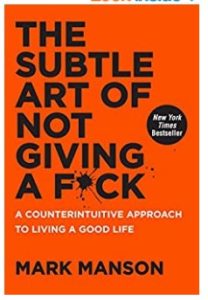 This post is about Challenges (sometimes called “problems” by other people). It was inspired by some ideas I learned from a book I just finished called “The Subtle Art of Not Giving a F*ck” by Mark Manson. I should warn you… the F-word is used throughout the book… ALOT. Not that it bothered me as I was reading. It seemed to come from the author’s authentic voice and probably added more “flavor” to the book than if he had used the word”care” instead.
This post is about Challenges (sometimes called “problems” by other people). It was inspired by some ideas I learned from a book I just finished called “The Subtle Art of Not Giving a F*ck” by Mark Manson. I should warn you… the F-word is used throughout the book… ALOT. Not that it bothered me as I was reading. It seemed to come from the author’s authentic voice and probably added more “flavor” to the book than if he had used the word”care” instead.
Bottom Line?
It is a book about what you care about and how to deal with things that you either don’t care about or should not care about. Obviously understanding the difference for each of those categories is critical for anyone who wants to lead a productive, successful and fulfilling life.
Bottom Line… good book. Read it.
Now let’s talk about Challenges…
Everyone has problems. I prefer to use the word “Challenges” (and it should be clear why by the end of this post) but Mark calls them problems so we will go with that… for now.
Picture two people.
The first one is the richest person in the world. Or maybe just the richest person you know or have heard of. For this example, NOT Donald Trump (his problems are in a completely different class). Getting back to the rich dude… Do you think they have problems? Think about it… Where are they going to invest all their money? Who can they trust with their money? Maybe they want to help people… which charity (out of the millions who might deserve help) should they donate to? Finally, how are they going to spend their money? If you have not seen the movie Brewster’s Millions with Richard Pryor, find a copy and watch it. Rich people definitely have problems.
On the other end of the spectrum, picture the poorest person in the world. Hopefully it is not someone you know. Maybe they have horrible clothes that don’t keep them warm enough. It is easy to imagine that they don’t know where their next meal will come from or where they will sleep. It is not hard to imagine their problems.
Why are we comparing these two people?
First they both have problems. In Life, you will always have problems. Get over it and move on.
Second, and this is a critical point, there are different types of problems. Some problems are better to have than others. What if the rich person was overweight and had terminal cancer? All of their “good problems” might be wiped out by a bad problem.
Where am I going with this?
You are going to have problems and you are going to have to deal with them. The Buddha put a different way, “Life is suffering.” Mark says “Life is a never-ending series of problems.”
Let’s Talk Happiness
It may seem like a hard right turn to go from “everyone has problems” and “Deal with it” to talking about Happiness but Mark brings up a good point in his book that explains how problems are related to your happiness. (And probably not in the way that you expect.)
One of the premises in Mark’s book is that “Happiness is solving problems.” Mark adds, “To be happy, we need something to solve. Happiness is therefore a form of action.”
I like this idea. Happiness is not a destination. It is something you do along the journey.
In other words, don’t bother saying “I will be happy when I get a raise” or “… when I get married” or “… when I have kids”. Solve the problems that are in front of you and keep moving in the direction of your dreams… knowing that happiness is a worthwhile journey.
Happiness is a process.
Part of that process is figuring out what you are willing to tackle, which problems you might LIKE to solve, while you are on the journey to your dreams.
There will be problems you would have never chosen… but they still need to be solved. The funny (?) thing is that everyone will run into a pile of sh*t along the way. The question is what (or how much) are you willing to push through to get a great life?
Mark says, “Struggles determine our successes. Our problems birth our happiness, along with slightly better, upgraded problems.”
In other words, the joy is in the struggle!
Quick Review:
- Everyone has problems (both good and bad).
- We will always have problems and the act of solving them brings happiness (“along with slightly better problems”.)
- We get to choose how we approach our problems.
(Hint: we can call them challenges or opportunities.)
(More about how to approach challenges/problems in Part II of this post)
